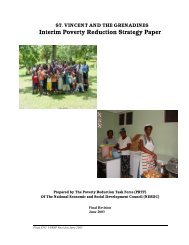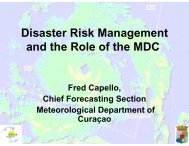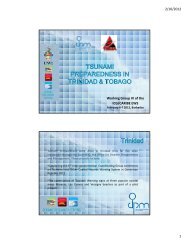The Anatomy of A Silent Crisis The Anatomy of A Silent Crisis
The Anatomy of A Silent Crisis The Anatomy of A Silent Crisis
The Anatomy of A Silent Crisis The Anatomy of A Silent Crisis
- TAGS
- anatomy
- www.bb.undp.org
You also want an ePaper? Increase the reach of your titles
YUMPU automatically turns print PDFs into web optimized ePapers that Google loves.
Critical areas <strong>of</strong> human impact<br />
the first five years compared to non-resource related conflicts. 173 For example, the potential for<br />
armed conflict over water resources is <strong>of</strong>ten seen as an imminent threat to security as 263 river<br />
basins are shared by two or more countries, 174 and water supply is fast depleting in many <strong>of</strong> these<br />
water reservoirs in areas like Middle East and Central Africa. However, past predictions <strong>of</strong> large<br />
scale water wars have not come to pass and increased cooperation has instead prevailed. 175<br />
Most shared water resources are managed peacefully through cross-border engineering and<br />
diplomacy with increased security collaboration, i.e. UN peacekeeping reform, and resource<br />
sharing agreements like the over 200 water treaties negotiated in the last 50 years. 176 In fact,<br />
many processes associated with global warming, have occurred during a time when the world<br />
has witnessed a dramatic reduction in the frequency and severity <strong>of</strong> armed conflict. 175 <strong>The</strong> main<br />
reasons for this include the end <strong>of</strong> the Cold War; increased international cooperation to prevent<br />
and stem conflict; rapid economic growth in parts <strong>of</strong> the world once rife with conflict, such as<br />
areas <strong>of</strong> Eastern Europe; and United Nations peacekeeping operation reforms.<br />
Future conflict or cooperation?<br />
Based on historical precedent, resource sharing and cooperation have been the rule, not the<br />
exception, but what is in store for a future impacted by climate change remains in the hands <strong>of</strong><br />
humankind. <strong>The</strong> number <strong>of</strong> people vulnerable to the effects <strong>of</strong> climate change to security is projected<br />
to increase. 171 <strong>The</strong>se people live in countries that are not currently unstable but there are concerns<br />
about their capacity to maintain stability in the face <strong>of</strong> increased human impact from climate<br />
change, <strong>of</strong>ten due to factors such as recent transitions out <strong>of</strong> dictatorship and war, and economic<br />
development challenges.<br />
Climate change is linked to a range <strong>of</strong> threats to international peace and security that are<br />
subject to increasing attention and study. Three examples <strong>of</strong> these are energy, terrorism and<br />
Arctic exploration:<br />
• <strong>The</strong> majority <strong>of</strong> global oil reserves and production is located in the regions that are most<br />
vulnerable to climate change: the dry land belt countries from the Sahel through the Middle<br />
East to Central Asia. Large oil-importers, such as the United States, China and Europe, regard<br />
energy insecurity as an important threat and are concerned over potential regional instabilities<br />
caused by climate change. <strong>The</strong>re are fears that conflicts may disrupt supply from energy<br />
producing countries and further intensify global competition for energy resources. 176<br />
• Climate change has also been linked to terrorism because it can serve as a threat multiplier for<br />
instability in the most volatile regions <strong>of</strong> the world which are vulnerable to civil unrest and the<br />
growth <strong>of</strong> extremist ideology. 163<br />
• As polar ice caps are melting, new coveted waterways are opening up in the Arctic along with<br />
increased access to new mineral deposits and natural resources. This may ignite international<br />
territorial disputes, exemplified by the outcry after Russia planted a flag in a seabed below the<br />
North Pole in 2007. 164<br />
55







